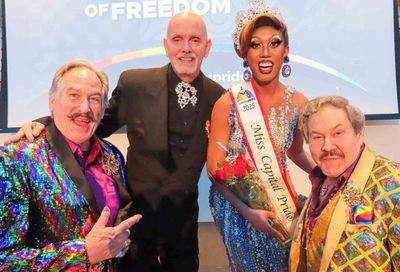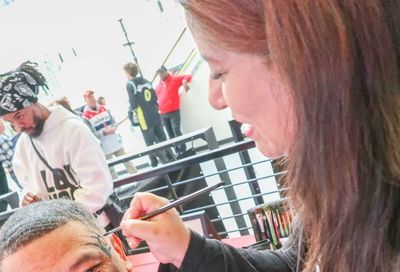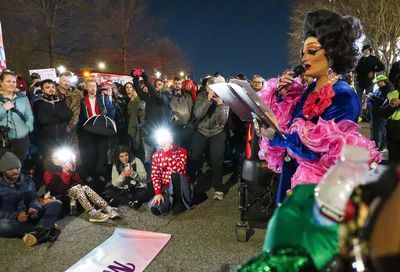Effeminate Gay Men Face a “Gay Glass Ceiling” in the Workplace
A new study finds that anti-gay bias and misogyny may lead feminine-presenting gay men to be offered fewer career advancement opportunities.

A new study has found that both gay and heterosexual men discriminate against more feminine-presenting gay men when it comes to filling high-status roles.
The study, conducted by researchers from the University of Sydney, the results of which were published in the prestigious peer-reviewed journal Sex Roles, finds that gay men who exhibit more traditionally feminine qualities, such as a higher voice or effeminate mannerisms, are more likely to be discriminated against when it comes to career advancement opportunities.
As part of the study, researchers created a mock TV commercial casting brief for a campaign promoting tourism in Sydney.
The mock campaign purported to sell Sydney to potential travelers as a go-to destination, and the casting called for an actor who could be viewed as a leader or someone who would be admired by viewers.
Ben Gerrard, a researcher in gender and sexuality at the University of Sydney’s School of Psychology, who is also a professional actor, created videos of six shortlisted “candidates” using professional actors — all gay men in real life — three of whom acted out the commercial with traditionally feminine mannerisms, and three of whom displayed traditionally masculine mannerisms while acting out the same three scripts.
After viewing the pairs of commercials, 256 male subjects — half of whom identified as gay and half as heterosexual — who viewed both versions of the commercial were more likely to select the masculine-presenting male actor for the role of “leader.”
Researchers found that for heterosexual study participants, anti-gay sentiments influenced their preference for the more masculine-presenting actor, while misogyny influenced both heterosexual and gay study participants’ votes.
Gerrard says the results of the study, especially the finding that self-identified gay males were more likely to be biased agains feminine-presenting actors, are not only disappointing, but indicate that more feminine-presenting or feminine-acting gay men may face a “gay glass ceiling” in workplace environments.

“Gay men are potentially blocking each other from positions of power and leadership due to this implicit bias,” Gerrard said, according to a news writeup from the University of Sydney’s media department.
“Men are still expected to conform to more traditional masculine styles of leadership, and if they fail to sufficiently project masculine traits, they are at risk of status penalties. This is an example of internalized homophobia among the gay community and it impacts opportunities for these gay men.”
Gerrard added, “We operate in teams-based workplaces now where effective leadership qualities — warmth, empathy, and good communication — are all considered feminine traits, and a more feminine-presenting gay man might be an ideal candidate for a leadership role.
“And yet we still value traditional masculinity at a senior leadership level as a measure of the capacity to lead, because traditional feminine traits are considered too soft or not authoritative enough.”
Gerrard also said the study’s findings may point to the need for further advocacy or anti-bias workplace training to combat potential discrimination, not only against feminine-presenting gay men, but against gay men who are “out” at the workplace and may have feminine qualities ascribed to them.
Due to those perceived feminine qualities, openly gay men, regardless of how they present, are less likely to obtain interviews, are rated less positively when it comes to job performance reviews, and are offered lower salaries than their straight male counterparts.
As a result, due to the existence of such a “gay glass ceiling,” gay men may either consciously or unconsciously attempt to suppress feminine traits.
“This homophobic bias is putting pressure on feminine-presenting gay men to conform so they might be passable as a heterosexual man,” Gerrard said.
“What we need is an increase in authentic representation of empowered feminine-presenting gay men — especially in the media: in order to counter misinformed biases regarding their ability to lead. There needs to be education and awareness, within the community and in recruitment processes, around the potential to be unconsciously influenced by these unfair biases.”
Support Metro Weekly’s Journalism
These are challenging times for news organizations. And yet it’s crucial we stay active and provide vital resources and information to both our local readers and the world. So won’t you please take a moment and consider supporting Metro Weekly with a membership? For as little as $5 a month, you can help ensure Metro Weekly magazine and MetroWeekly.com remain free, viable resources as we provide the best, most diverse, culturally-resonant LGBTQ coverage in both the D.C. region and around the world. Memberships come with exclusive perks and discounts, your own personal digital delivery of each week’s magazine (and an archive), access to our Member's Lounge when it launches this fall, and exclusive members-only items like Metro Weekly Membership Mugs and Tote Bags! Check out all our membership levels here and please join us today!


























You must be logged in to post a comment.